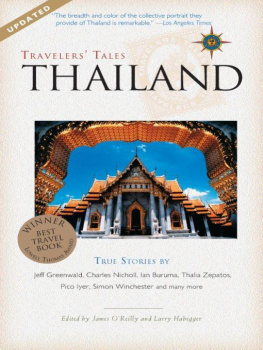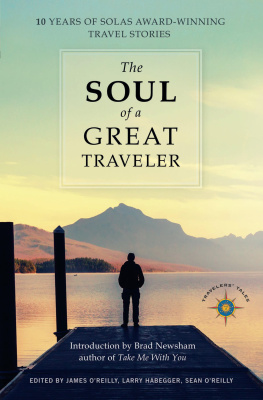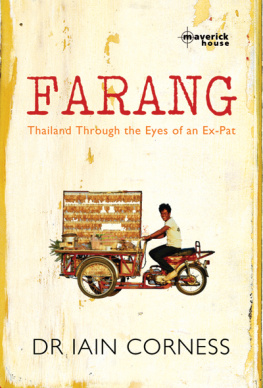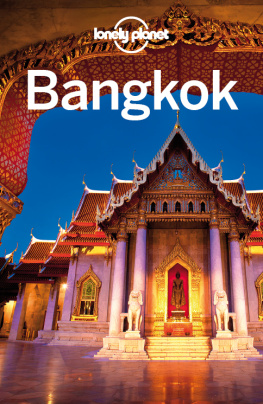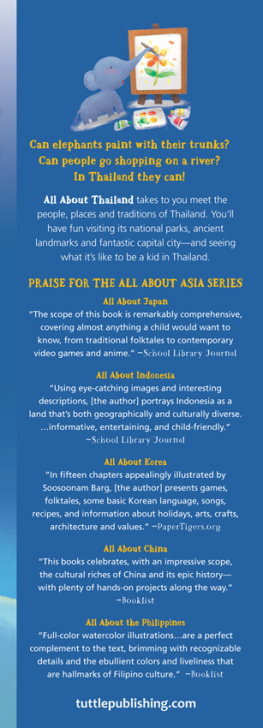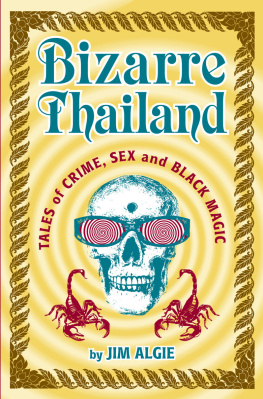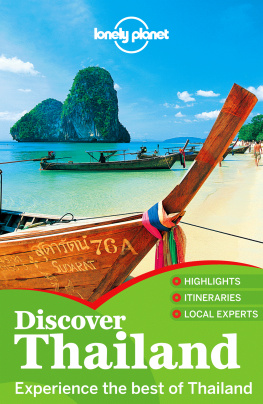Table of Contents
CRITICAL ACCLAIM FOR TRAVELERS TALES THAILAND
This is the best background reading Ive ever seen on Thailand.
Carl Parkes, author of Thailand Handbook, Southeast Asia Handbook
I loved Travelers Tales Thailand . It parts the curtain on a country that has long fascinated and mystified me.
David Lamb, author of A Sense of Place
The breadth and color of the collective portrait they provide of Thailand is remarkable.
Colman Andrews, Los Angeles Times
Travelers Tales Thailand provides a rich and varied look at this ancient and exotic nation[it] showed me parts of Thailand I never would have found with a map and a standard guidebook. Many of these pieces read like short stories and thats the beauty. The places and the people are real; the events could happen to anyone.
Judges citation, Society of American Travel Writers Foundation, Lowell Thomas Travel Journalism Awards
OReilly and Habegger have not settled for the obvious. As a result this anthology offers a comprehensive and fascinating introduction to the Land of Smiles.
The Elliot Bay Book Company, Seattle
For travelers who want a wider introduction to a country and its culture, Travelers Tales is a valuable addition to any pre-departure reading list.
Tony Wheeler, publisher, Lonely Planet Publications
[The] essayscompose a highly personal geographical and cultural portrait of Thailand.
Travel & Leisure
It made me homesick for Thailand.
Seth Jacobson, Epicurean International, Inc.
TRAVELERS TALES BOOKS
Country and Regional Guides
America, Australia, Brazil, Central America, Cuba, France, Greece, India, Ireland, Italy, Japan, Mexico, Nepal, Spain,Thailand; American Southwest, Grand Canyon, Hawaii, Hong Kong, Paris, San Francisco,Tuscany
Womens Travel
Her Fork in the Road, A Womans Path, A Womans Passion for Travel, A Womans World,Women in the Wild, A Mothers World, Safety and Security for Women Who Travel, Gutsy Women, Gutsy Mamas
Body & Soul
The Spiritual Gifts of Travel,The Road Within, Love & Romance, Food,The Fearless Diner,The Adventure of Food,The Ultimate Journey, Pilgrimage
Special Interest
Not So Funny When It Happened, The Gift of Rivers, Shitting Pretty,Testosterone Planet, Danger!,The Fearless Shopper,The Penny Pinchers Passport to Luxury Travel,The Gift of Birds, Family Travel, A Dogs World,Theres No Toilet Paper on the Road Less Traveled,The Gift of Travel, 365 Travel
Footsteps
Kite Strings of the Southern Cross,The Sword of Heaven, Storm, Take Me With You, Last Trout in Venice, The Way of the Wanderer, One Year Off, The Fire Never Dies
Classics
The Royal Road to Romance, Unbeaten Tracks in Japan, The Rivers Ran East
Tham dii, di dii; tham cha, di cha.
Do good, get good; do evil, get evil.
THAI PROVERB
Preface
TRAVELERS TALES
We are all outsiders when we travel. Whether we go abroad or roam about our own country, we often enter territory so unfamiliar that our frames of reference become sorely inadequate. We need advice not just to avoid offense and danger, but to make our experiences richer, deeper, and more fun.
Traditionally, travel guides have answered the basic questions: what, when, where, how, and how much. A good guidebook is indispensable for all the practical matters that demand attention. More recently, many guidebooks have added cultural and experiential insight to their standard fare, but something important is still missing. Guidebooks dont really prepare you , the individual with feelings and fears, hopes and dreams, goals.
This kind of inner preparation is best achieved through travelers tales, for we get our landmarks more from anecdote than from information. Nothing can replace listening to the experience of others, to the war stories that come out after a few drinks, to the memories that linger and beguile. For millennia it has been this way: at watering holes and wayside inns, the experienced traveler tells those nearby what lies ahead on the ever-mysterious road. Stories stoke the imagination, inspire, frighten, and teach. In stories we see more clearly the urges that bring us to wander, whether its hunger for change, adventure, self-knowledge, love, curiosity, sorrow, or even something as prosaic as a job assignment or two weeks off.
But travelers accounts, while profuse, can be hard to track down. Many are simply doomed in a throwaway publishing world. And few of us have the time anyway to read more than one or two books, or the odd pearl found by chance in the Sunday newspaper travel section. Wanderers for years, weve often faced this issue. Weve always told ourselves when we got home that we would prepare better for the next tripread more, study more, talk to more peoplebut life always seems to interfere and weve rarely managed to do so to our satisfaction. That is one reason for this series. We needed a kind of experiential primer that guidebooks dont offer.
Another path that led us to Travelers Tales has been the enormous change in travel and communications over the last two decades. It is no longer unusual to have ridden a pony across Mongolia, to have celebrated an auspicious birthday on Mt. Kilimanjaro, or honeymooned on the Loire. The one-world monoculture has risen with daunting swiftness, weaving a new cross-cultural rug with it: no longer is it surprising to encounter former headhunters watching All-Star Wrestling on their satellite feed, no longer is it shocking to find the last guy at the end of the earth wearing a Harvard t-shirt and asking if you know Michael Jordan. The global village exists in a rudimentary fashion, but it is real.
In 1980, Paul Fussell wrote in Abroad: British Literary Traveling Between the Wars a cranky but wonderful epitaph for travel as it was once known, in which he concluded that we are all tourists now, and there is no escape. It has been projected that by the year 2000, tourism will be the worlds largest industry; some say it already is. In either case, this is a horrifying prospecthordes of us hunting for places that have not been trod on by the rest of us!
Fussells words have the painful ring of truth, but this is still our world, and it is worth seeing and will be worth seeing next year, or in 50 years, simply because it will always be worth meeting others who continue to see life in different terms than we do, despite the efforts of telecommunication and advertising talents. No amount of creeping homogeneity can quell the endless variation of humanity, and travel in the end is about people, not places. Places only provide different venues, as it were, for life, in which we are all pilgrims who need to talk to each other.
There are also many places around the world where intercultural friction and outright xenophobia are increasing. And the very fact that travel endangers cultures and pristine places more quickly than it used to calls for extraordinary care on the part of todays traveler, a keener sense of personal responsibility. The world is not our private zoo or theme park; we need to be better prepared before we go, so that we might become honored guests and not vilified intruders.

